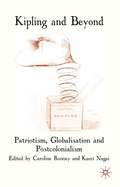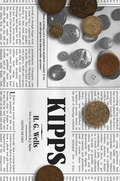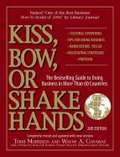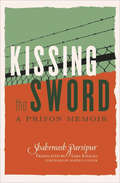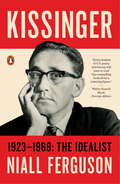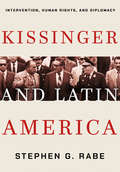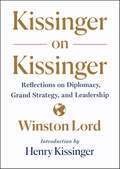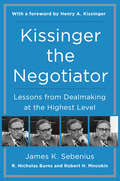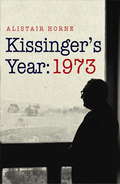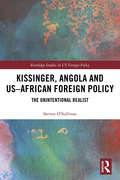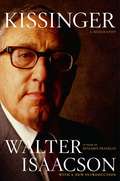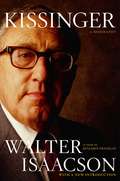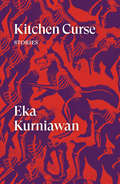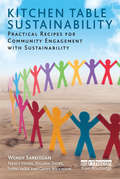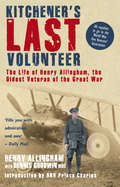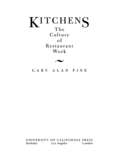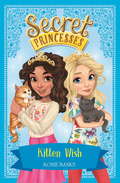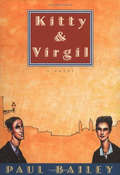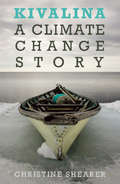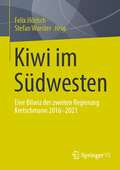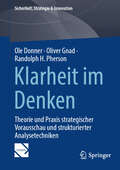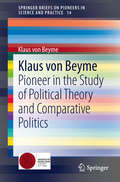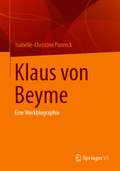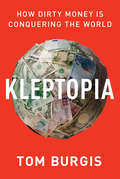- Table View
- List View
Kipling and Beyond
by Caroline Rooney Kaori NagaiFeaturing an internationally distinguished list of contributors, Kipling and Beyond reassesses Kipling's texts and their reception in order to explore new approaches in postcolonial studies. The collection asks why Kipling continues to be a significant cultural icon and what this legacy means in the context of today's Anglo-American globalization.
Kipps: With an introduction by D.J. Taylor
by H.G. Wells'FIRST ELECTRICITY. AND THEN TELEPHONES. I FEEL AS IF I WERE LIVING IN AN H G WELLS NOVEL' DOWAGER COUNTESS OF GRANTHAM'You can enjoy the novel as a jolly yarn about faux pas - there's a bit of Kipps in most of us - but you also sense that Wells found its theme a little close to the bone . . . As social inequality threatens to rise, it's hard not to wonder - despite the happy ending - if Kipps belongs to britain's future as well as its past' GuardianOrphaned at an early age, raised by his aunt and uncle, and apprenticed for seven years to a draper, Artie Kipps is stunned to discover upon reading a newspaper advertisement that he is the grandson of a wealthy gentleman and the inheritor of his fortune. Thrown dramatically into the upper classes, he struggles desperately to learn the etiquette and rules of polite society. But as he soon discovers, becoming a `true gentleman' is neither as easy nor as desirable as it at first appears...
Kiss, Bow, Or Shake Hands: The Bestselling Guide to Doing Business in More Than 60 Countries, Second Edition (Kiss, Bow Or Shake Hands Series)
by Terri Morrison Wayne A. ConawayThis is a guide to proper international business protocol. With countries such as China and India taking on a more significant role in the global business landscape, you can't afford not to know the practices, customs, and philosophies of other countries.
Kissing the Sword: A Prison Memoir
by Shahrnush ParsipurA moving account of life as a political prisoner in post-revolutionary Iran from the acclaimed Iranian author of Women Without Men. Shahrnush Parsipur was a successful writer and television producer in her native Iran until the Revolution of 1979. Soon after seizing control, the Islamist government began detaining its citizens—and Parsipur found herself incarcerated without charges. Kissing the Sword captures the surreal experience of serving time as a political prisoner and witnessing the systematic elimination of opposition to fundamentalist power. It is a harrowing narrative filled with both horror and humor: nights blasted by machine gun fire as detainees are summarily executed, days spent debating prison officials on whether the Quran demands that women be covered. Parsipur, one of modern Iran&’s great literary voices, mines her painful life experiences to deliver an urgent call for the most basic of human rights: the freedom of expression. &“Parsipur makes a stylishly original contribution to modern feminist literature.&” —Marjane Satrapi, author of Persepolis &“Stands as a powerful testament to not only the devastations of an era, but to the integrity and courage of an extraordinary woman.&” —Kirkus Reviews &“Parsipur&’s memoir is a powerful tale of a writer&’s struggle to survive the worst cases of atrocities and injustice with grace and compassion. A terribly dark but truly illuminating narrative; Parsipur forces the reader to question human nature and resilience.&” —Shirin Neshat, artist
Kissinger
by Niall FergusonThe definitive biography of Henry Kissinger, based on unprecedented access to his private papersNo American statesman has been as revered or as reviled as Henry Kissinger. Once hailed as "Super K"--the "indispensable man" whose advice has been sought by every president from Kennedy to Obama--he has also been hounded by conspiracy theorists, scouring his every "telcon" for evidence of Machiavellian malfeasance. Yet as Niall Ferguson shows in this magisterial two-volume biography, drawing not only on Kissinger's hitherto closed private papers but also on documents from more than a hundred archives around the world, the idea of Kissinger as the ruthless arch-realist is based on a profound misunderstanding.The first half of Kissinger's life is usually skimmed over as a quintessential tale of American ascent: the Jewish refugee from Hitler's Germany who made it to the White House. But in this first of two volumes, Ferguson shows that what Kissinger achieved before his appointment as Richard Nixon's national security adviser was astonishing in its own right. Toiling as a teenager in a New York factory, he studied indefatigably at night. He was drafted into the U.S. infantry and saw action at the Battle of the Bulge--as well as the liberation of a concentration camp--but ended his army career interrogating Nazis. It was at Harvard that Kissinger found his vocation. Having immersed himself in the philosophy of Kant and the diplomacy of Metternich, he shot to celebrity by arguing for "limited nuclear war." Nelson Rockefeller hired him. Kennedy called him to Camelot. Yet Kissinger's rise was anything but irresistible. Dogged by press gaffes and disappointed by "Rocky," Kissinger seemed stuck--until a trip to Vietnam changed everything. The Idealist is the story of one of the most important strategic thinkers America has ever produced. It is also a political Bildungsroman, explaining how "Dr. Strangelove" ended up as consigliere to a politician he had always abhorred. Like Ferguson's classic two-volume history of the House of Rothschild, Kissinger sheds dazzling new light on an entire era. The essential account of an extraordinary life, it recasts the Cold War world.
Kissinger and Latin America: Intervention, Human Rights, and Diplomacy
by Stephen G. RabeIn Kissinger and Latin America, Stephen G. Rabe analyzes U.S. policies toward Latin America during a critical period of the Cold War. Except for the issue of Chile under Salvador Allende, historians have largely ignored inter-American relations during the presidencies of Richard M. Nixon and Gerald R. Ford. Rabe also offers a way of adding to and challenging the prevailing historiography on one of the most preeminent policymakers in the history of U.S. foreign relations. Scholarly studies on Henry Kissinger and his policies between 1969 and 1977 have tended to survey Kissinger's approach to the world, with an emphasis on initiatives toward the Soviet Union and the People's Republic of China and the struggle to extricate the United States from the Vietnam conflict. Kissinger and Latin America offers something new—analyzing U.S. policies toward a distinct region of the world during Kissinger's career as national security adviser and secretary of state.Rabe further challenges the notion that Henry Kissinger dismissed relations with the southern neighbors. The energetic Kissinger devoted more time and effort to Latin America than any of his predecessors—or successors—who served as the national security adviser or secretary of state during the Cold War era. He waged war against Salvador Allende and successfully destabilized a government in Bolivia. He resolved nettlesome issues with Mexico, Peru, Ecuador, and Venezuela. He launched critical initiatives with Panama and Cuba. Kissinger also bolstered and coddled murderous military dictators who trampled on basic human rights. South American military dictators whom Kissinger favored committed international terrorism in Europe and the Western Hemisphere.
Kissinger on Kissinger: Reflections on Diplomacy, Grand Strategy, and Leadership
by Winston LordIn a series of riveting interviews, America's senior statesman discusses the challenges of directing foreign policy during times of great global tension.As National Security Advisor to Richard Nixon, Henry Kissinger transformed America's approach to diplomacy with China, the USSR, Vietnam, and the Middle East, laying the foundations for geopolitics as we know them today.Nearly fifty years later, escalating tensions between the US, China, and Russia are threatening a swift return to the same diplomatic game of tug-of-war that Kissinger played so masterfully. Kissinger on Kissinger is a series of faithfully transcribed interviews conducted by the elder statesman's longtime associate, Winston Lord, which captures Kissinger's thoughts on the specific challenges that he faced during his tenure as NSA, his general advice on leadership and international relations, and stunning portraits of the larger-than-life world leaders of the era. The result is a frank and well-informed overview of US foreign policy in the first half of the 70s—essential reading for anyone hoping to understand tomorrow's global challenges.
Kissinger the Negotiator: Lessons from Dealmaking at the Highest Level
by James K. Sebenius Robert H. Mnookin R. Nicholas Burns“A straightforward examination of Kissinger’s finely honed skills . . . offers keen insight for anyone interested or involved in negotiations at any level.”—James A. Baker III, sixty-first U.S. secretary of stateIncludes a foreword by Henry KissingerIn this groundbreaking, definitive guide to the art of negotiation, three Harvard professors—all experienced negotiators—offer a comprehensive examination of one of the most successful dealmakers of all time.Politicians, world leaders, and business executives around the world—including eleven consecutive US presidents—have sought the counsel of Henry Kissinger, a brilliant diplomat and historian whose unprecedented achievements as a negotiator have been universally acknowledged. The first book of its kind, Kissinger the Negotiator provides a clear analysis of Kissinger’s overall approach to making deals and resolving conflicts—expertise that holds powerful and enduring lessons.James K. Sebenius (Harvard Business School), R. Nicholas Burns (Harvard Kennedy School of Government), and Robert H. Mnookin (Harvard Law School) crystallize the key elements of Kissinger’s approach, based on in-depth interviews with the former secretary of state himself about some of his most difficult negotiations, an extensive study of his record, and many independent sources. Taut and instructive, Kissinger the Negotiator mines the long, fruitful career of this elder statesman and shows how his strategies apply not only to contemporary diplomatic challenges but to other realms of negotiation, including business, public policy, and law.Essential reading for current and future leaders, Kissinger the Negotiator is an invaluable guide to reaching agreements in challenging situations.“A very readable and informative book that will serve future negotiators well. It also presents a new look at the importance of Henry Kissinger’s role in forming the world in which we now live.” —Booklist“An all-star trio of experts on negotiation in business, law, and diplomacy [has] done a great service in elucidating the actions of a very skilled American diplomat.” —The New York Times Book Review“This book, based on deep interviews and research, shows [Kissinger’s] strengths and weaknesses [and] the lessons to be learned.”—Walter Isaacson, #1 New York Times–bestselling author of Elon Musk and Kissinger: A Biography
Kissinger's Year: 1973
by Alistair HorneThe life of Henry Kissinger seen through one seminal year - 1973.1973 was a seminal year in world history. The outbreak of the 'Yom Kippur War' took both Israel and the US by surprise, the Vietnam War finally ended, it was the year of détente with the Soviet Union, but the US executive was in a state of collapse following Watergate, and the year ended with the Muslim-initiated energy crisis, which brought the Western world to the brink of economic disaster - a story of deepest relevance today.This book is the biography of Kissinger - the first he has authorised - viewed through the events of this crucial year. A story of his extraordinarily imaginative aims, his near successes, and, as he admits, his ultimate failures.
Kissinger's Year: 1973
by Sir Alistair Horne CBEThe life of Henry Kissinger seen through one seminal year - 1973.1973 was a seminal year in world history. The outbreak of the 'Yom Kippur War' took both Israel and the US by surprise, the Vietnam War finally ended, it was the year of détente with the Soviet Union, but the US executive was in a state of collapse following Watergate, and the year ended with the Muslim-initiated energy crisis, which brought the Western world to the brink of economic disaster - a story of deepest relevance today.This book is the biography of Kissinger - the first he has authorised - viewed through the events of this crucial year. A story of his extraordinarily imaginative aims, his near successes, and, as he admits, his ultimate failures.
Kissinger, Angola and US-African Foreign Policy: The Unintentional Realist (Routledge Studies in US Foreign Policy)
by Steven O'SullivanAnalysing US foreign policy towards Angola during the Ford administration, this book provides an intriguing insight into one of the most avoidable and unfortunate episodes in Cold War history and explores the impact on Henry Kissinger’s much vaunted reputation for being guided by realist principles. Kissinger has dominated political discourse and scholarship on US foreign policy since the 1970s, but although his legacy continues to generate controversy, little attention has been paid to the influence of Vietnam’s collapse on the US decision to covertly intervene in the Angolan civil war. This book argues that Kissinger’s concern for personal reputation and US credibility following the collapse of Vietnam led to a harmful and unrealistic policy toward Angola. Exposure of US covert intervention exacerbated domestic and international political tensions and the subsequent showdown between the excutive and legislative branches ironically resulted in Kissinger proclaiming a new departure in US–African relations. Thus, it is argued that Kissinger was an ‘unintentional realist’ rather than an intellectual proponent of realpolitik. Enhancing our understanding of Kissinger, his relationship with his subordinates and with Congress, and his approach to foreign policy, this book will be of interest to scholars of Cold War history, US foreign policy and all those fascinated by the personality of Henry Kissinger.
Kissinger: A Biography
by Walter IsaacsonBy the time Henry Kissinger was made secretary of state in 1973, he had become, according to the Gallup Poll, the most admired person in America and one of the most unlikely celebrities ever to capture the world's imagination. Yet Kissinger was also reviled by large segments of the American public, ranging from liberal intellectuals to conservative activists. Kissinger explores the relationship between this complex man's personality and the foreign policy he pursued. Drawing on extensive interviews with Kissinger as well as 150 other sources, including U. S. presidents and his business clients, this first full-length biography makes use of many of Kissinger's private papers and classified memos to tell his uniquely American story. The result is an intimate narrative, filled with surprising revelations, that takes this grandly colorful statesman from his childhood as a persecuted Jew in Nazi Germany, through his tortured relationship with Richard Nixon, to his later years as a globe-trotting business consultant.
Kissinger: A Biography
by Walter IsaacsonThe definitive biography of Secretary of State Henry Kissinger and how his ideas still resonate in the world today from the bestselling author of Leonardo da Vinci and Steve Jobs.By the time Henry Kissinger was made secretary of state in 1973, he had become, according to the Gallup Poll, the most admired person in America and one of the most unlikely celebrities ever to capture the world's imagination. Yet Kissinger was also reviled by large segments of the American public, ranging from liberal intellectuals to conservative activists. Kissinger explores the relationship between this complex man&’s personality and the foreign policy he pursued. Drawing on extensive interviews with Kissinger as well as 150 other sources, including US presidents and his business clients, this first full-length biography makes use of many of Kissinger&’s private papers and classified memos to tell his uniquely American story. The result is an intimate narrative, filled with surprising revelations, that takes this grandly colorful statesman from his childhood as a persecuted Jew in Nazi Germany, through his tortured relationship with Richard Nixon, to his later years as a globe-trotting business consultant.
Kitchen Curse: Stories
by Eka KurniawanNominated for the Man Booker International, Eka Kurniawan brings his short stories into English for the first time Eka Kurniawan’s freewheeling imagination explores the turbulent dreams of an ex-prostitute, the hapless life of a perpetual student, victims of an anticommunist genocide, the travails of an elephant, even the vengeful fantasies of a stone. Dark, sexual, scatological, violent, and mordantly funny, these fractured fables span city and country, animal and human, myth and politics. Like nothing else, Kurniawan’s stories bury themselves in the mind. His characters and insights are at once hauntingly familiar, peculiar, and twisted.
Kitchen Table Sustainability: Practical Recipes for Community Engagement with Sustainability (Earthscan Tools for Community Planning)
by Cathy Wilkinson Wendy Sarkissian Nancy Hofer Yollana Shore Steph VajdaKitchen Table Sustainability offers a unique view of sustainability through the lens of community engagement. It takes sustainability out of the ivory towers of universities, government departments and planners to the kitchen tables of the world. This practical guide distils decades of wisdom from community planning, engagement and sustainability practice internationally into a user-friendly and engaging book that is both inspirational and packed with hands-on tools. The core of the book is a bottom-up approach to participatory community engagement and development, referred to as EATING, that consists of six components: Education, Action, Trust, Inclusion, Nourishment and Governance.
Kitchener's Last Volunteer: The Life of Henry Allingham, the Oldest Surviving Veteran of the Great War
by Dennis Goodwin Henry AllinghamHenry Allingham is the last British serviceman alive to have volunteered for active duty in the First World War and is one of very few people who can directly recall the horror of that conflict. In Kitchener's Last Volunteer, he vividly recaptures how life was lived in the Edwardian era and how it was altered irrevocably by the slaughter of millions of men in the Great War, and by the subsequent coming of the modern age.Henry is unique in that he saw action on land, sea and in the air with the British Naval Air Service. He was present at the Battle of Jutland in 1916 with the British Grand Fleet and went on to serve on the Western Front. He befriended several of the young pilots who would lose their lives, and he himself suffered the privations of the front line under fire.In recent years, Henry was given the opportunity to tell his remarkable story to a wider audience through a BBC documentary, and he has since become a hero to many, meeting royalty and having many honours bestowed upon him.This is the touching story of an ordinary man's extraordinary life - one who has outlived six monarchs and twenty-one prime ministers, and who represents a last link to a vital point in our nation's history.
Kitchens
by Gary Alan FineKitchens takes us into the robust, overheated, backstage world of the contemporary restaurant. In this rich, often surprising portrait of the real lives of kitchen workers, Gary Alan Fine brings their experiences, challenges, and satisfactions to colorful life. A new preface updates this riveting exploration of how restaurants actually work, both individually and as part of a larger culinary culture.
Kitten Wish: Book 7 (Secret Princesses #7)
by Rosie BanksA magical new series where best friends become Secret Princesses! In the sparkly second series, Princess Poison has stolen Princess Ella's magic wand. Without it, Princess Ella won't be able to grant any animal-related wishes.Best friends and Secret Princess trainees, Charlotte and Mia, have to help Princess Ella get her wand back by granting four animal-related wishes. Can they help Hannah find homes for all the kittens she's found - and will her kitten wish be granted?
Kitty & Virgil: A Novel
by Paul BaileyA &“luminous&” story of love and sorrow spanning from London to Romania, from a prize-winning novelist (Publishers Weekly, starred review). Kitty Crozier first laid eyes on Virgil Florescu, a dissident poet who swam across the Danube to escape Ceausescu&’s Romania, in the hospital. She woke up after surgery to find a stranger sitting beside her bed gazing at her. He just smiled, then stood and left the room. She next sees him in London&’s Green Park picking up litter from the grass with a long spike. So begins the most important, most demanding, most exhilarating relationship of Kitty&’s life. As their love for each other deepens, their previous lives, and very different families, reveal themselves to be oddly connected, in this novel from a recipient of literary honors including a Somerset Maugham Award, an E. M. Forster Award, and a George Orwell Prize, as well as two Man Booker Prize nominations. &“At once a wistful and tender love story and a harrowing account of how people from two utterly different cultures and ways of looking at the world can find, then lose, each other . . . Virgil is a superb creation.&” —Publishers Weekly (starred review)
Kivalina: A Climate Change Story
by Christine ShearerThe true story of an Alaska Native village destroyed by flooding and erosion caused by climate change—and how they fought for help.Warming Arctic temperatures have been making coastal areas of Alaska increasingly uninhabitable. In 2008, the small Alaska Native village of Kivalina filed a legal claim against some of the world’s largest fossil fuel companies for damaging their homeland and creating a false debate around climate change. Academic and former journalist Christine Shearer explores the history leading up to the lawsuit, its connections to disaster management and adaptation, and its relationship to past misinformation campaigns involving lead, asbestos, and tobacco. Kivalina’s struggle for safe relocation, the book argues, is part of our common struggle to acknowledge and address climate change before it is too late.2012 Rachel Carson Environment Book Award (Honorable Mention)Praise for Kivalina“Moving, infuriating, ominous . . . . Shearer provides an impressively concise and comprehensive history of the growth of corporate power in America; its influence on, entwinement with, and corruption of government; [and] corporate obfuscation of industrial hazards.” —Publisher’s Weekly“Best book of 2011: one of the most timely and important books to be published in 2011—and in the past decade.” —Jeff Biggers, The Huffington Post“In novelistic detail, Shearer recounts the science, politics, legal battles, and human experience at one of the leading edges of climate change impact. In doing so, she . . . tells the story not just of one village in Alaska, but of us all.” —The Society of Environmental Journalists
Kiwi im Südwesten: Eine Bilanz der zweiten Regierung Kretschmann 2016-2021
by Felix Hörisch Stefan WursterNach der ersten grün-roten Landesregierung in einem deutschen Bundesland von 2011 bis 2016 in Baden-Württemberg führte Winfried Kretschmann von 2016 bis 2021 zum zweiten Mal eine grün-geführte Landesregierung an – eine lagerübergreifend grün-schwarze Kiwi-Koalition. Auch diese Regierungskonstellation ist bislang in der deutschen Geschichte einmalig. Der Sammelband analysiert, wie sich dieser Regierungswechsel von Grün-Rot zur selbst ernannten grün-schwarzen Komplementärkoalition in den verschiedenen Politikfeldern auf die durchgesetzten Policies ausgewirkt hat. Neben dem expliziten Vergleich der durchgeführten Reformen in den beiden Legislaturperioden beleuchten einzelne Kapitel des Sammelbands beispielsweise auch die Koalitionsbildungsprozesse, die Bürgerbeteiligung und den Einfluss organisierter Interessen unter der zweiten Landesregierung Kretschmann sowie die Verschiebungen im Parteiensystem in Baden-Württemberg.
Klarheit im Denken: Theorie und Praxis strategischer Vorausschau und strukturierter Analysetechniken (Sicherheit, Strategie & Innovation)
by Randolph H. Pherson Oliver Gnad Ole DonnerDieses Buch versetzt Analystinnen und Analysten in Regierung, Privatwirtschaft und Think Tanks in die Lage, globale Risiken und Chancen systematisch zu bewerten, informierte Entscheidungen zu treffen und Unvorhergesehenes zu antizipieren. Die Autoren beleuchten die Grundlagen intuitiven und analytischen Denkens und zeigen auf, wie strukturierte Analysetechniken die Auswirkungen kognitiver Verzerrungen, falsch angewandter Heuristiken und intuitiver Fallen abmildern können. Drei Fallstudien veranschaulichen die Anwendung von über 30 Strukturierten Analyse-Techniken (SAT) in Schritt-für-Schritt-Anleitungen.
Klaus von Beyme
by Klaus BeymeKlaus von Beyme, a highly distinguished German political scientist, has been recognised as a "Pioneer in the Study of Political Theory and Comparative Politics". When he received the highly esteemed Mattei Dogan Award during the XXII World Congress of Political Science in Madrid on 12 July 2012, in his laudatio Rainer Eisfeld portrayed Klaus v. Beyme as a "Global Scholar and Public Intellectual". On the occasion of Klaus v. Beyme's 80th birthday this book offers a selection of his major previously published and new texts focusing on "Empirical Political Theory", "The Evolution of Comparative Politics, Revival of Normative Political Theory in Empirical Research", "Theodor W. Adorno - Political Theory as Theory of Aesthetics", "Historical Forerunners of Policy Studies", "Political Institutions - Old and New", "Representative Democracy and the Populist Temptation", "Political Advisors to Politicians", and on "The Concept of Political Class: A New Dimension of Research on Elites?".
Klaus von Beyme: Eine Werkbiographie
by Isabelle-Christine PanreckKlaus von Beyme forschte und lehrte im Zeitalter der Konfrontationen und Umbrüche: Der Kalte Krieg, die Studentenrevolte 1968/69, die Spaltung des politikwissenschaftlichen Fachverbandes 1983 und der Systemwechsel 1989/90 hinterließen ihre Spuren in den Schriften des international bekannten Heidelbergers. Die Werkbiographie durchdringt das umfangreiche Werk von Beymes, offenbart ideengeschichtliche, zeithistorische und biographische Wurzeln, zeitgenössischen Widerhall in politischen und fachlichen Kontroversen sowie langfristige Prägungen der deutschen Politikwissenschaft.
Kleptopia: How Dirty Money Is Conquering the World
by Tom Burgis“A must-read for anyone wanting to better understand what has already happened here in America and what lies ahead if Trump is reelected in November…. A magisterial account of the money and violence behind the world’s most powerful dictatorships.” –Washington PostIn this shocking, meticulously reported work of narrative nonfiction, an award-winning investigative journalist exposes “capitalism’s monster”—global kleptocracy—and reveals how it is corrupting the world around us.They are everywhere, the thieves and their people. Masters of secrecy. Until now we have detected their presence only by what they leave behind. A body in a burned-out Audi. Workers riddled with bullets in the Kazakh Desert. A rigged election in Zimbabwe. A British banker silenced and humiliated for trying to expose the truth about the City of London.They have amassed more money than most countries. But what they are really stealing is power.In this real-life thriller packed with jaw-dropping revelations, award-winning investigative journalist Tom Burgis weaves together four stories that reveal a terrifying global web of corruption: the troublemaker from Basingstoke who stumbles on the secrets of a Swiss bank, the ex-Soviet billionaire constructing a private empire, the righteous Canadian lawyer with a mysterious client, and the Brooklyn crook protected by the CIA.Glimpses of this shadowy world have emerged over the years. In Kleptopia, Burgis connects the dots. He follows the dirty money that is flooding the global economy, emboldening dictators, and poisoning democracies. From the Kremlin to Beijing, Harare to Riyadh, Paris to the White House, the trail shows something even more sinister: the thieves are uniting. And the human cost will be great.
